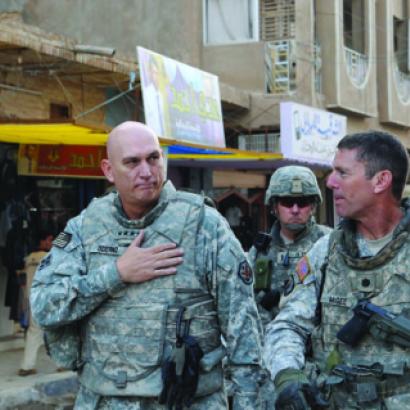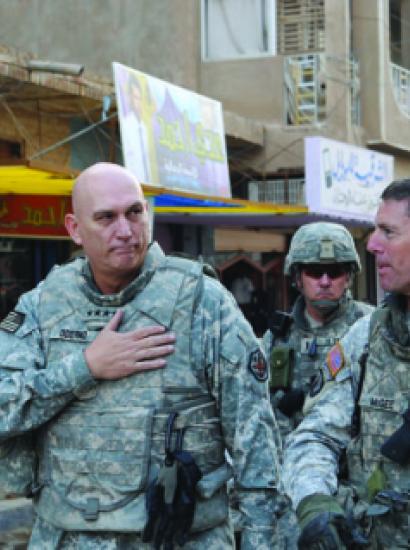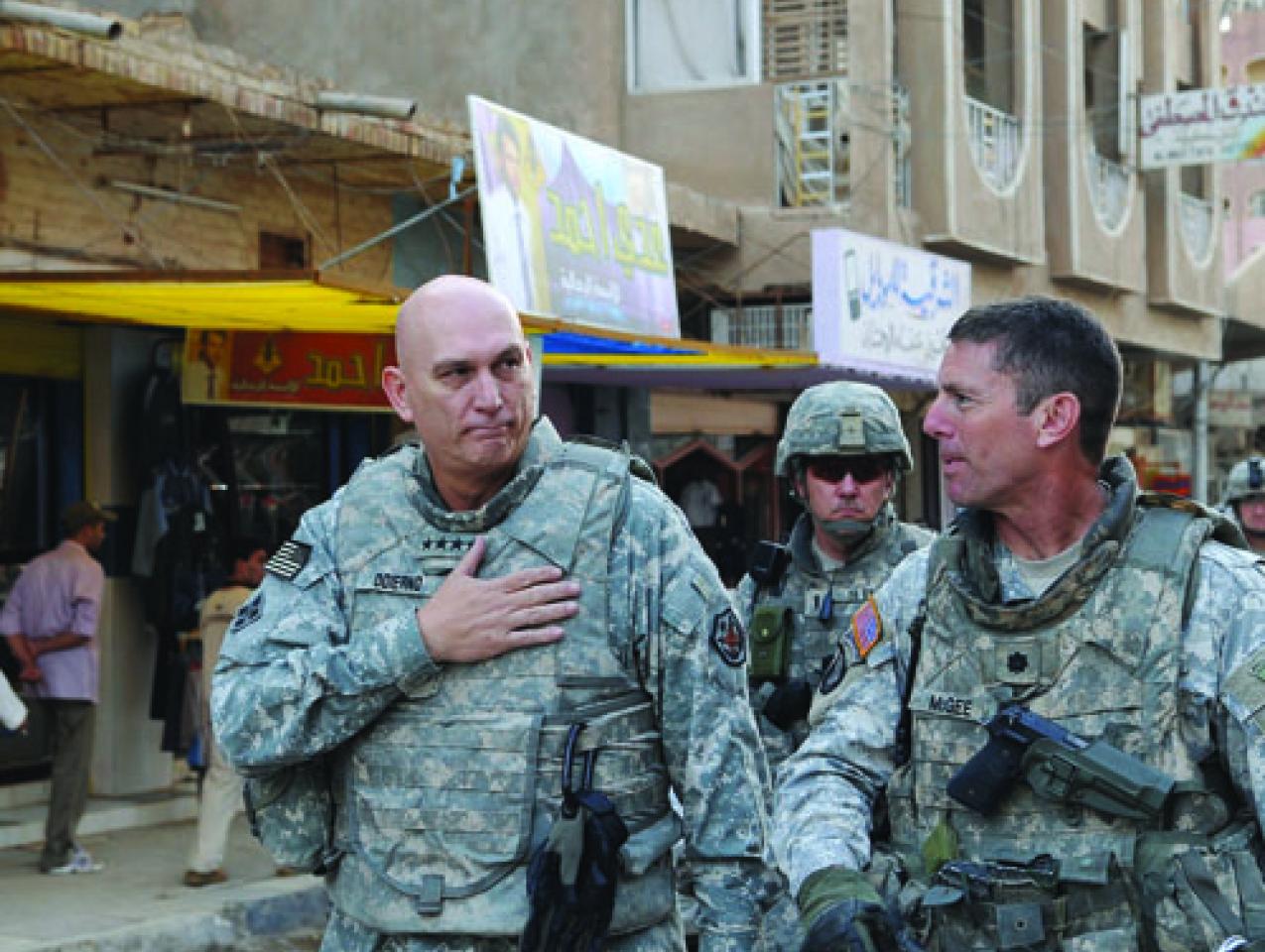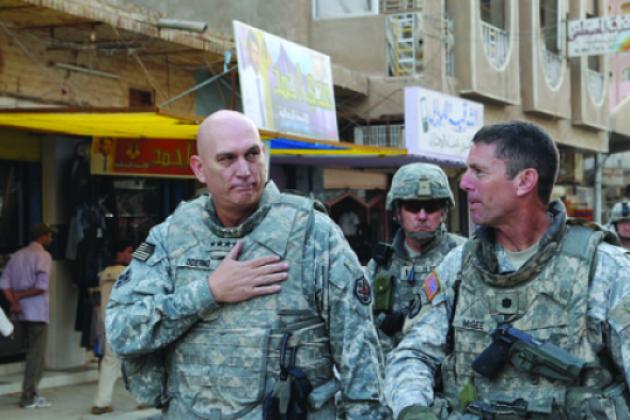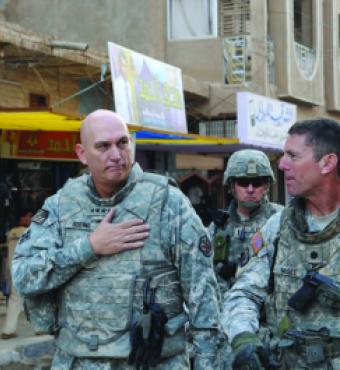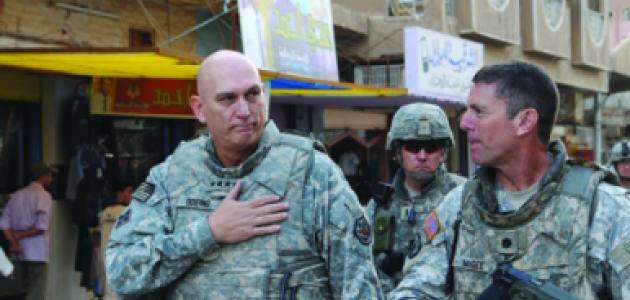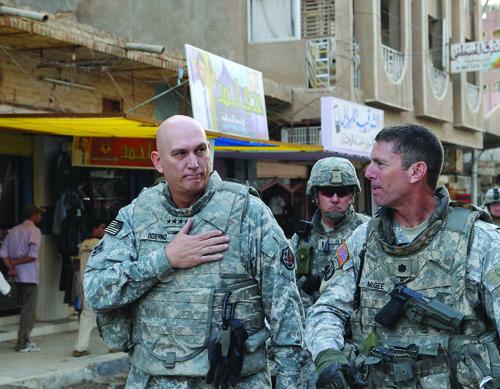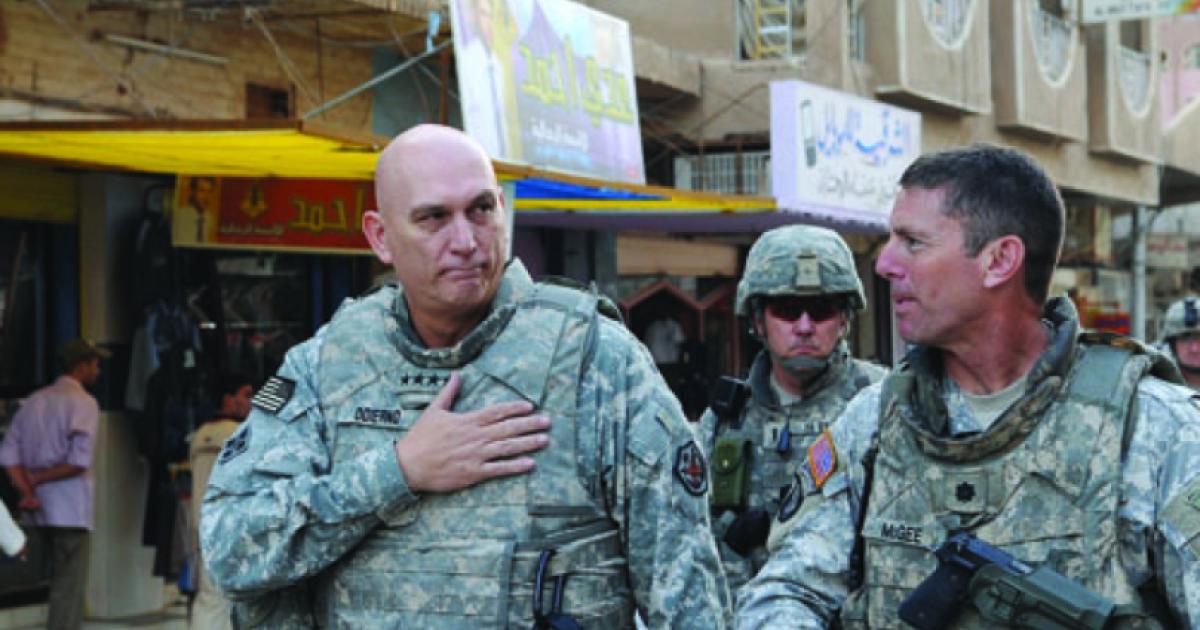- International Affairs
- US Foreign Policy
- Security & Defense
- US Defense
- Terrorism
- Law & Policy
- Civil Rights & Race
From October 2007 to November 2008, I served as the commander of Task Force No Slack, a subunit of the 1st Brigade of the 101st Airborne Division. This unit of one thousand U.S. soldiers operated in and around Samarra, Iraq. Our forces, in conjunction with Iraqi Security Forces and a local militia called the Sons of Iraq, defeated the insurgency in the area. When we arrived, the enemy was launching some 135 attacks per month; when we departed, monthly attacks were down to fewer than ten. During the course of our deployment we shifted our focus from fighting the insurgency to rebuilding the local government and providing essential services to the roughly 225,000 Iraqis who lived in our area. As a result of my experiences in Samarra, I gained a profound respect for the laws of war and how they can be a powerful force to increase the effectiveness of a counterinsurgent force.
In 2007, Samarra remained one of the most restive and lawless areas in Iraq. The effects of the “surge” of 2007 had largely been negative for Samarra, with the enemy fleeing Baghdad and moving to the outlying areas. Samarra, which had never been fully pacified, was one of the enemy’s favorite destinations. In the summer of 2007, the security situation within Samarra disintegrated. An organization called the Islamic State of Iraq (ISI, part of the larger Al-Qaeda in Iraq) controlled more than half the city and virtually all the surrounding areas. In those areas it established its own style of governance. ISI collected taxes, held trials, conducted public executions, and had military parades to demonstrate its power to the people of the region.
Yet as ISI became larger and more powerful, it began to act in a way that hurt its strategy and undermined its support from the people, behaving too brutally and too rigidly. Its harsh brand of Islam was contrary to what most Iraqis believed. ISI agents would cut off the fingers of Iraqis who smoked. They held public executions on street corners based on rumors and hearsay. The most repugnant of all practices, however, was its kidnapping of young girls and forcibly marrying them to foreign fighters—effectively sharia-sanctioned rape. The people of Samarra were learning that there was a much worse alternative to their government and the Americans, namely, being ruled by Al-Qaeda-inspired fundamentalists.
Into this complex, hyperviolent environment we arrived and set about conducting operations. As we spent time talking to Iraqis from all walks of life, one surprising theme emerged and remained constant: instead of despising us, Iraqis respected the Americans. In an area beset with lawlessness and violence, they viewed us as the only legitimate force in the area. One major reason that the Iraqis came to see us as legitimate was our respect for the laws of war, as practiced each day by our soldiers on patrol.
RESPECT AT EVERY LEVEL
The Iraqis knew we were not perfect, but they largely accepted that we were doing all we could to avoid civilian casualties and operate ethically. Our commitment to the rules of engagement, based on the laws of war, greatly contributed to the esteem in which U.S. forces were held.
Most remarkable to me was that the foundation of this legitimacy rested on the shoulders of some very young soldiers. Our junior soldiers and noncommissioned officers symbolized American values every day they patrolled our area. These soldiers—almost all under the age of twenty-five, many under twenty-one—dealt with life-and-death issues: is that a car bomb approaching me or just an errant driver? Why is that man on the side of the road using his cell phone? Is he talking to his friend or is he a spotter for an ambush? It was the actions of these young soldiers, day after day, that truly established the Iraqi impression of the United States.
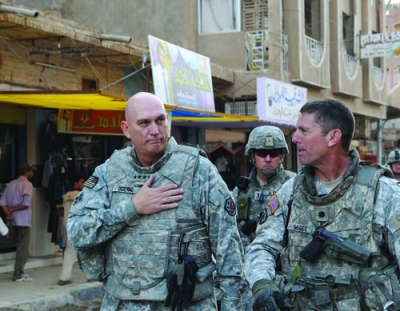
General Ray Odierno, left, then–U.S. commander in Iraq, walks through Samarra in 2008 with Army officer Joseph McGee, at the time commander of 2-327 Infantry Battalion, 1st Brigade Combat Team, 101st Airborne Division. Colonel McGee writes that “it’s my firm belief that the proper conduct of our forces, following the rules of war, can profoundly help our operations.”
This respect for the rule of law and professionalism by our soldiers was transmitted to the Iraqi Security Forces at the lowest level. We routinely conducted joint patrols with the Iraqi Security Forces, and the powerful example of a twenty-one-year-old U.S. sergeant skillfully leading his troops much impressed the younger Iraqis in the ranks. They wanted to emulate their U.S comrades.
Not all ran smoothly with the Iraqi Security Forces; sometimes our position on the conduct of operations and how to treat people ran directly counter to Iraqis’ views and actions. The most serious problem in this area was the treatment of detainees. U.S. forces learned much after the disgraceful and criminal events at Abu Ghraib prison, so that throughout the U.S. Army, proper treatment of detainees was emphasized and became part of our training. In sharp contrast, Iraqis beat and tortured detainees all too regularly. If we discovered this misconduct, we took control of the detainee, put him into the U.S. detention system, and filed reports to ensure that both my superiors and Iraqi leaders knew of the abuse. These reports of misconduct seldom resulted in Iraqi disciplinary action. At my level I would meet with the Iraqi commander and voice my displeasure, but there was little more that I could do.
Over time, however, we made a small difference, and Iraqi forces began to treat detainees better. As they embraced these practices, the people’s view of the Iraqi forces’ legitimacy increased, bringing many attendant benefits. As we moved forward to address other issues, such as how to reconcile former insurgents to our side, these reforms helped engender goodwill and furthered our progress.
I spoke with an Iraqi ally about detainees and their treatment. He had been a colonel in the Iraqi army but lost his job in the aftermath of the U.S. invasion, when the army was disbanded. He was one of the key negotiators who brokered the agreement whereby two thousand local Iraqis, including many insurgents, came to the side of their government and the United States and later proved instrumental in quelling the insurgency.
One day I asked him about Abu Ghraib and its impact on Iraqis. I said, “I have seen the way all Iraqi forces treat their detainees. It doesn’t matter if they are army, National Police, or Sons of Iraq—all of them beat and torture detainees. What you do to your own is much worse than anything that was done in Abu Ghraib by Americans to Iraqi prisoners. Where is the outrage? Where is the indignation that filled Iraqis when they saw the pictures from Abu Ghraib? Why is there such a double standard?”
He looked at me, shook his head knowingly, and said, “My friend, you do not understand. First, you must remember that this occurred during a war and that you provided Al-Qaeda a great tool with your actions in Abu Ghraib—and they exploited it masterfully. Second, you have to remember that you are Americans and we have different standards for you. You came to Iraq under the banner of democracy and respect for human rights. Your actions in Abu Ghraib, along with many of your other actions, demonstrated you did not believe in these values and dropped them as soon as things became difficult. Abu Ghraib convinced many of us that you were not serious about how you wanted to change Iraq or the values that you proclaimed, and it convinced many to take arms against you.”
For me, this story illustrates that our actions are more powerful and more important than any proclamations we make. Our respect for the rules of war, our commitment to conduct ourselves ethically in difficult situations, is absolutely vital. If we truly want to prevail in these conflicts, we must reinforce our words with actions that demonstrate we believe in them even under duress.
PROTECTING CIVILIANS—HOW IT PAYS OFF
For the good that comes from following the laws of war, sometimes following these laws can be a hindrance. Invariably, detainees do not divulge critical information, bombs are not dropped because of collateral-damage concerns, and soldiers are slow to engage a target because they are not completely convinced it represents a threat. It is no secret that attempting to follow the laws of war with respect to terrorist detainees has gummed up our detention system and left us with no effective way to handle a terrorist captured in foreign lands outside of Afghanistan and Iraq.
Some will argue that following the rules of warfare slows the reaction time of soldiers in contact—and a preoccupation with minimizing collateral damage will place U.S. soldiers in greater risk. Certainly, following the rules of warfare slows the reaction time and forces commanders to be discriminating in their use of firepower. Yet this discriminating and precise use of firepower, in the aggregate, does more good than harm—even at the lowest level. A recent study by the London School of Economics has determined a strong link between U.S. actions that have caused civilian casualties in Afghanistan and a corresponding rise in attacks against U.S. forces. Thus, minimizing civilian casualties is proving effective at lowering the levels of violence against our forces.
This should not be hard for anyone to understand. The loss of innocent family members would place most people in a position of trying to exact vengeance. By being precise and discriminating, we are not only protecting the innocent but also protecting our own forces in the long term.
The drawbacks of following the laws of war pale in comparison with the benefits we gain from operating in an ethically principled manner. Many of the laws of warfare are extensions of national values we claim. The proper treatment of detainees is deeply rooted in the concept of individual rights—an American value. The laws that limit where we drop bombs and how we conduct operations all come back to a fundamental respect for a person’s right to live unmolested. When we choose to follow these rules in the most dangerous circumstances, we are showing the world that we believe in these values and are willing to make sacrifices to live them. And I believe these actions resound within the population of the countries where we operate.
It’s my firm belief that the proper conduct of our forces, following the rules of war, can profoundly help our operations. In a conflict in which the population has the decisive vote, which is often cast based on whom the people view as legitimate, the actions of U.S. soldiers can have a deep impact on which side people choose to support. I often hear critics say that the populations of Iraq and Afghanistan will always resent and hate the presence of the United States in their countries; this is not true, as has been proved time and again in public opinion polls in those countries. For example, a recent ABC/BBC poll of 1,691 Afghans asked this question: “Do you strongly support, somewhat support, somewhat oppose or strongly oppose the presence of the following groups in Afghanistan today?” Sixty-three percent supported or strongly supported U.S. forces in Afghanistan; 53 percent supported or strongly supported NATO/ISAF in Afghanistan. Interestingly, only 11 percent of those polled supported or strongly supported the Taliban; only 17 percent supported or strongly supported foreign jihadi fighters.
I believe the actual troop-strength numbers are almost insignificant; what matters is how they act and what they are doing. One thousand U.S. soldiers in Iraq, terrorizing the population through the indiscriminate application of force, operating outside the rules of war, would be viewed very differently from 150,000 of those same U.S. soldiers operating in a measured, controlled manner within the rules of war to make the country safer and more stable.
Some will argue that our enemies uses these rules of war against us—that they understand what they can and cannot do and use this to improve their operations. Undeniably this is true; terrorists and insurgents use our rules against us, which limits our effectiveness in the short term. In the long term, however, I believe those actions are self-defeating and do much to hinder terrorists’ popular support.
One other important benefit from ensuring that U.S. soldiers follow the rules of war and act in an ethical fashion is how it helps the troops themselves and eases their transition back into civilian society. A soldier operating overseas in places such as Afghanistan or Iraq daily carries the power of life and death over the people in those countries. Heavily armed, often scared, and frequently frustrated, a soldier can become aggressive in operating among the population. Unchecked and improperly led, a soldier can develop techniques for handling situations that, although not criminal, are improper. Soldiers may speak derisively to civilians, push or manhandle detainees, ram vehicles on the street, fire their weapons excessively to warn approaching vehicles, or, when engaged in a firefight, use their firepower indiscriminately. Soldiers and leaders could attempt to justify these actions by saying they are in a tough situation filled with many dangers, and that this is the only way to be effective. Yet most soldiers have a sharp sense of right and wrong. In the short term they can justify their overaggressive actions; in the long term they will know they acted inappropriately, which can cause serious psychological damage.
Multiple combat psychologists spoke to me about the importance of instilling an ethos of restraint and respect for the local people, not just because it was operationally effective but also because it made for fewer psychological issues when the troops came home. It is the leaders’ responsibility to give them orders that will maximize their chances of mission success, as well as let them emerge from combat proud of what they have done and how they have acted. If a leader’s orders are in accordance with the laws of war, he will have done a great deal to ensure this will happen.
My experiences have taught me that following the laws of warfare and instilling the importance of ethical conduct in our soldiers are critical forces in a counterinsurgency. The actions of our armed forces, often carried out by its youngest members, do much to bestow legitimacy on our presence; this legitimacy is a critical foundation for success.








